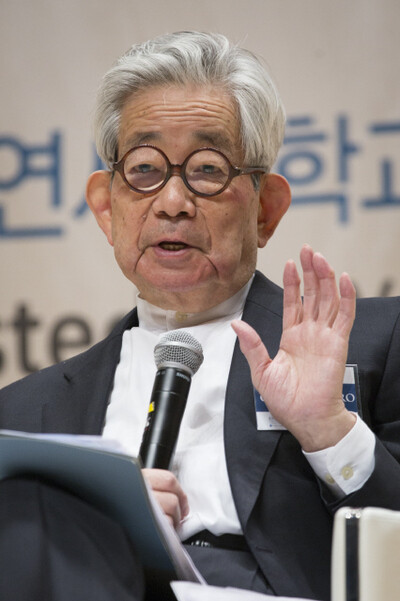hankyoreh
Links to other country sites 다른 나라 사이트 링크
Kenzaburo Oe urges Abe to reflect on Japan’s past

“Shinzo Abe is refusing to acknowledge Japan’s terrible past. Japan needs the imagination to forge a new reality through profound reflection on the war.”
Novelist Kenzaburo Oe delivered a scathing critique of the refusal of Prime Minister Shinzo Abe and other Japanese political leaders to acknowledge the country’s past actions. The remarks came while the 81-year-old author was attending the Yonsei-Kim Dae-jung World Future Forum, an event staged by Yonsei University and the Kim Dae-jung Presidential Library and Museum at the university‘s Baekyang Concert Hall on Mar. 13 to mark the 130th anniversary of the school’s foundation.
“They say imagination alone is not enough to solve the social problems of today, but I believe imagination is something powerfully connected to reality,” Oe said as part of a keynote speech titled “The Future of Human Sensibility.”
The novelist, who was awarded a Nobel Prize in Literature in 1994, was in South Korea at the invitation of Kim Dae-jung Peace Center chairperson and former First Lady Kim Hee-ho.
“As part of the postwar generation, I developed all the sensibilities in my work while imagining a new society after the war in my teens and twenties,” Oe recalled.
“It seems like that’s the period that Abe most hates to remember and feels most ashamed of,” he continued, directing a message of blunt criticism toward the current administration. “He didn’t experience the Second World War, and I don‘t know he can even imagine just how terrible the crimes Japan committed back then were.”
“Abe wants to forge a new era by rejecting all the efforts Japanese society made to achieve something democratic and humane in the ten years after the war,” Oe said of the administration.
“The bigger problem is that over half of the Japanese public is sending votes of support to the administration,” he added, sounding a note of concern about the strong approval Abe enjoys at home.
“The crimes Japan committed against Asia, and the people of the Korean Peninsula and Korea in particular, were truly atrocious, and I don’t feel that Japan has apologized enough for them,” Oe said.
Oe, who published his first book in 1958, is one of the leading writers and pacifists of Japan’s postwar era. Awarded the Nobel Prize in 1994 for works such as “The Silent Cry”, he has been a consistent voice against the Abe administration’s militarization and nuclear power in the wake of the 2011 East Japan earthquake and tsunami.
Oe, who has been in poor health recently, said, “In Korean years, I’m 81, so I’m already over eighty.”
“Our future now hinges on forging a new sensibility in individuals. I will spend the last of my days pleading and thinking on those lines,” he continued.
“If we can combine feeling and sensitivity as people of the future generation who are capable of making a contribution to the world, I believe we will gain bearings toward a clearer form of wisdom.”
By Lee You-jin, staff reporter
Please direct questions or comments to [english@hani.co.kr]

Editorial・opinion
![[Guest essay] The real reason Korea’s new right wants to dub Rhee a founding father [Guest essay] The real reason Korea’s new right wants to dub Rhee a founding father](https://flexible.img.hani.co.kr/flexible/normal/500/300/imgdb/original/2024/0423/8317138574257878.jpg) [Guest essay] The real reason Korea’s new right wants to dub Rhee a founding father
[Guest essay] The real reason Korea’s new right wants to dub Rhee a founding father![[Column] ‘Choson’: Is it time we start referring to N. Korea in its own terms? [Column] ‘Choson’: Is it time we start referring to N. Korea in its own terms?](https://flexible.img.hani.co.kr/flexible/normal/500/300/imgdb/original/2024/0423/3617138579390322.jpg) [Column] ‘Choson’: Is it time we start referring to N. Korea in its own terms?
[Column] ‘Choson’: Is it time we start referring to N. Korea in its own terms?- [Editorial] Japan’s rewriting of history with Korea has gone too far
- [Column] The president’s questionable capacity for dialogue
- [Column] Are chaebol firms just pizza pies for families to divvy up as they please?
- [Column] Has Korea, too, crossed the Rubicon on China?
- [Correspondent’s column] In Japan’s alliance with US, echoes of its past alliances with UK
- [Editorial] Does Yoon think the Korean public is wrong?
- [Editorial] As it bolsters its alliance with US, Japan must be accountable for past
- [Guest essay] Amending the Constitution is Yoon’s key to leaving office in public’s good graces
Most viewed articles
- 1[Guest essay] The real reason Korea’s new right wants to dub Rhee a founding father
- 2Terry Anderson, AP reporter who informed world of massacre in Gwangju, dies at 76
- 3[Column] ‘Choson’: Is it time we start referring to N. Korea in its own terms?
- 4Why Korea shouldn’t welcome Japan’s newly beefed up defense cooperation with US
- 5Opposition calls Yoon’s chief of staff appointment a ‘slap in the face’
- 6[Column] The clock is ticking for Korea’s first lady
- 7Senior doctors cut hours, prepare to resign as government refuses to scrap medical reform plan
- 8New AI-based translation tools make their way into everyday life in Korea
- 9[Editorial] Japan’s rewriting of history with Korea has gone too far
- 10[Column] Are chaebol firms just pizza pies for families to divvy up as they please?